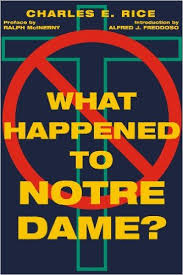Notre Dame has become the university equivalent of Ted Kennedy, so often touted as “America’s leading Catholic politician.” Notre Dame was once America’s leading Catholic university, but today, as Alfred J. Freddoso writes in his introduction to Charles E. Rice’s What Happened to Notre Dame?, the home of the Fighting Irish has become “something like a public school in a Catholic neighborhood.” Thus, Mr. Fredosso was not scandalized by the university’s invitation to Barack Obama to deliver this year’s commencement address. Many other Catholics were appalled.
Among them was Professor Ralph McInerny, who taught at Notre Dame for more than half a century and whose column here at The Catholic Thing, “Is Obama Worth a Mass,” was among the first and most widely read commentaries on the university’s decision to invite POTUS to address the Class of ‘09.
Charles Rice, a professor emeritus of Notre Dame’s law school, a LT COL in the Marine Corps Reserve (Ret.), and the father of ten, is not given to equivocation. He plainly states the problem with the university’s decision to invite the pro-choice President to give the commencement address:
[The university’s administration] committed, in perception but also in fact, the name and prestige of Notre Dame to the side that is hostile to major imperatives of faith and reason affirmed by the Catholic Church.
By reason of his support of abortion, embryonic stem cell research, cloning, healthcare rationing, and the abolition of conscience protections for Catholic healthcare professionals, Barack Obama should not have been given an honorary degree – America’s Catholic bishops had made that clear in 2004. The university, principally in the person of its president Fr. John Jenkins, justified the invitation by arguing that these signal social issues are simply several among a much longer list and that, in the overall, the President is an inspiring leader on the side of the angels in the matter of, as Jenkins put it, “immigration and education reform – and is addressing [these issues] with intelligence, courage and honesty . . .”
No, Professor Rice argues, there is a “unique gravity” to life issues, abortion especially. “In other words,” he writes, “there can be a just war, but there can never be a just abortion.”
What Happened to Notre Dame? (St. Augustine’s Press, $15.00) is actually a debate of sorts between Rice and Jenkins. Rice lets Jenkins “speak” at length, never quoting him out of context, and answering each point with his own (or often a bishop’s) understanding of the Church’s position on who may be honored by Catholic institutions. About that 2004 bishops’ statement, “Catholics in Political Life,” Fr. Jenkins suggests it applies only to Catholics who defy Catholic teaching and, therefore, not to the Protestant Obama. Rice cites the statement of John M. D’Arcy, Notre Dame’s supervising bishop (whom Jenkins did not consult in the matter), who has written that Jenkins is flat wrong. “I consider it . . . settled,” Bishop D’Arcy wrote to the members of his diocese, “that . . . ‘Catholics in [Political] Life’ . . . does indeed apply in this matter.” This was also the point embraced by Mary Ann Glendon in her decision not to accept the Laetare Medal at the ’09 commencement. Of the decision to award that honorary degree, she wrote to Fr. Jenkins:
This, as you must know, was in disregard of the U.S. bishops’ express request of 2004. . . . That request . . . seems to me so reasonable that I am at a loss to understand why a Catholic university should disrespect it.
But Notre Dame’s administrators ignored every plea to affirm its Catholic identity by respecting Church authority. Of course, this did not begin with the Obama controversy. It probably started in earnest with the misinterpretations of Vatican II that were accelerated by the attendees at a 1967 conference in Wisconsin and the statement they issued, named for the site of the confab: Land O’Lakes. In essence, it was a manifesto by some Catholic educators against the governance of the Church – both in terms of doctrine and administration. I’ve never read a clearer explanation of “Land O’Lakes” than Rice’s. Here you have it: Catholic intellectuals throwing off the cross of Catholicism itself. Down with the Roman tyrants! Hail the new “dictatorship of relativism”!
Reading this book, you feel sadness, if only because veteran teachers such as Ralph McInenry and Charles Rice express with such poignancy the loss of Notre Dame’s Catholic soul. To be sure, there is much about the university that remains praiseworthy, but Notre Dame seems well along on the road to becoming just another megaversity. This is not to say there is no hope. Notre Dame’s administration – a future administration – may yet embrace the Magisterium. As Rice explains:
What the teaching Church is doing today is counter-cultural but inspiring. Notre Dame should be fully a part of it, because the Church rescues reason from its false limitation to the empirical and affirms that the only coherent foundation of any university is the integration of faith and reason. “Faith and reason,” said John Paul II, “are like two wings on which the human spirit rises to the contemplation of truth.”
What Happened to Notre Dame? is not just a broadside against the scandal of the recent commencement. It is also a primer of faith, reason, and the first principles we must believe as Catholics and in which Catholic education must be grounded.















